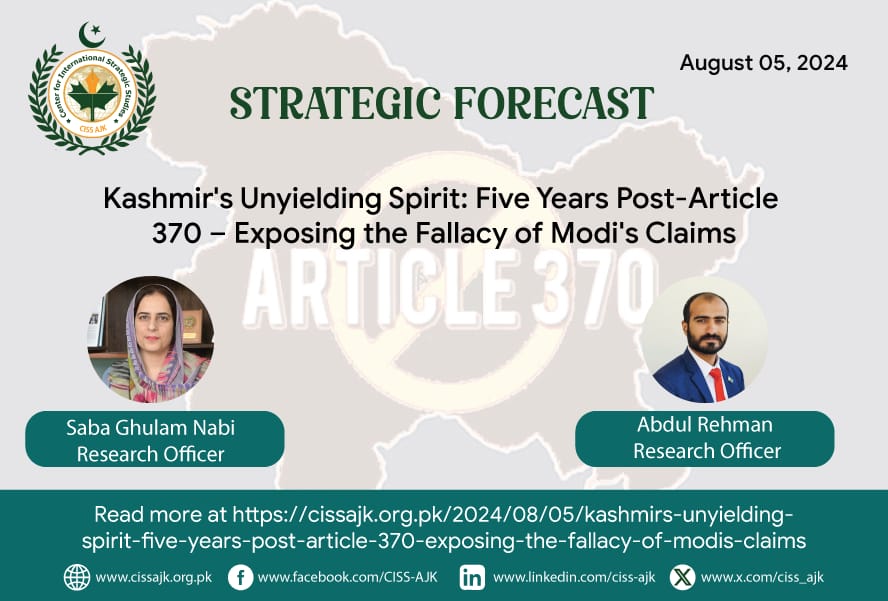The situation in the Indian Illegally Occupied Jammu and Kashmir (IIOJK), specifically post-revocation of Article 370, paints a grim picture characterized by perpetual violence and an unchecked display of authority by the Indian security forces. This reality has drastically curtailed the basic liberties of Kashmiris, leading to an alarming decline in the quality of life for the ordinary citizen. While the Kashmir Valley has faced significant militarization for several decades, the last five years since August 5, 2019, have witnessed an unending series of severe restrictions and unimaginable violence, extraordinary human rights violations, including enforced disappearances, sexual violence, torture, extrajudicial executions, unmarked and mass graves, and internet blackouts.
Modi’s claim that revoking Article 370 would bring development and peace to Kashmir has proven to be an illusion. Instead, the Indian government has had to resort to the use of force to suppress the mounting sentiments of the Kashmiri people. The use of force to achieve the false and “unrealistic” claim of normalcy has transformed Kashmir into a somber graveyard, with a prevailing atmosphere of fear stifling any open expression of dissent. Modi has left no stone unturned in causing harm to the socio-political and religious fabric of Kashmir. The authorities in Kashmir have permitted alcohol, undermining the region’s Islamic principles and threatening the moral fabric of society. Tourists and members of other Hindu communities now openly roam the streets of Kashmir after drinking, further threatening the moral fabric of society and adversely influencing the youth.
The inauguration of a Hindu temple in a Muslim-majority area risks exacerbating communal tensions. Additionally, legislative measures have intensified to change the demographics of the region, creating conflicts among tribes of Jammu and Kashmir specifically the Muslim tribes of Gujjar Bakerwal. Kashmiris are facing a severe energy crisis with unprecedented load shedding and steep electricity bill hikes. Ironically, the area, renowned for its abundant water resources, is also facing a significant water shortage. After four years of the revocation of Article 370, the Modi government has strategically resumed hearings on the matter just in time for the elections. The Indian Supreme Court’s decision on Article 370 has been perceived as an injustice to the Kashmiris. Before the revocation, the government claimed that Article 370 was the primary hurdle preventing development and peace in Jammu and Kashmir. However, five years on, despite the authorities using both fair and unfair means, they have failed to bring the promised development and peace to the region.
The current scenario reveals unfulfilled promises, with the people of Jammu and Ladakh, who initially supported the revocation, now demanding its reinstatement. Initially, only the people of the Kashmir Valley were deprived of basic rights and peace, but now the discontent has spread to Jammu and Ladakh as well. The people of Jammu and Ladakh initially celebrated the revocation, but they are now facing discrimination in commercial activities due to outsiders launching businesses, leading to calls for the return of Article 370. Ladakhis are also fighting for statehood, the 6th Schedule, and a Public Service Commission (PSC) to address unemployment, with Kargil leaders joining a hunger strike to show unity. They argue that the revocation of Article 370 was a blunder that disempowered them, leading to a loss of political rights and jobs and the threat of losing their lands. Modi’s claims that Article 370 was an obstacle have proven wrong, and people from across Jammu and Kashmir are demanding the return of Article 370. Indian PM Modi visited Kashmir after the 2024 Lok Sabha elections, in which the BJP failed to win a single seat in the region. In his speech, he again spoke about development and peace, but Kashmiris didn’t pay any attention to his claims as they were very much aware of his intentions and false promises.
The people of Jammu and Kashmir have also expressed anger at Modi’s statement, “We are witnessing Atal Vajpayee’s vision of Insaniyat, Jamhooriyat, and Kashmiriyat turning into a reality today,” because Modi has undermined Atal’s vision for J&K. By revoking the autonomous status of the state, he has destroyed Kashmiriyat. The imposition of black laws and illegal measures to change the demographics of the state is an attack on democracy, along with human rights violations in IIOJK, evidence of how he has disregarded Insaniyat. The previous historical record testifies that no matter whatever slogan is used to lure the people of Kashmir, their dissent is so deep-rooted that it cannot be eliminated. From “Sky is the Limit” to “winning hearts and minds” and now the promises of development, nothing can shake the Kashmiri spirit for their fundamental right to self-determination and lessen their dissent for India. Kashmiris will not hesitate to express their dissent whenever they find an opportunity to do so. Kashmiris cannot be lured by the “gold thrown from outside the window” when they are in a lockup.

